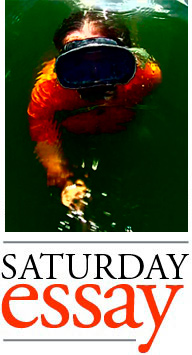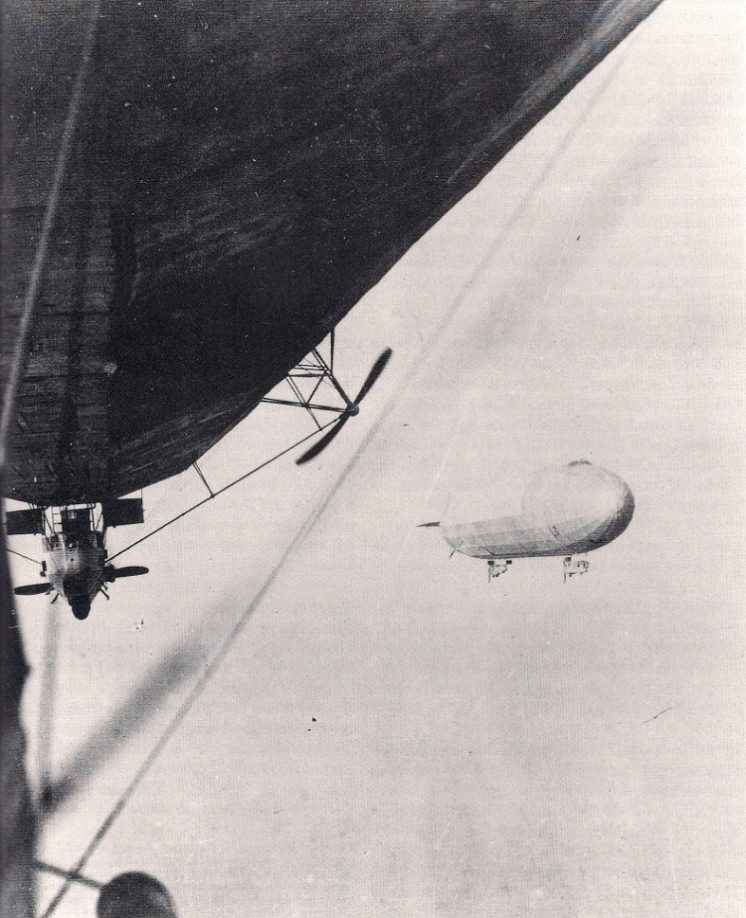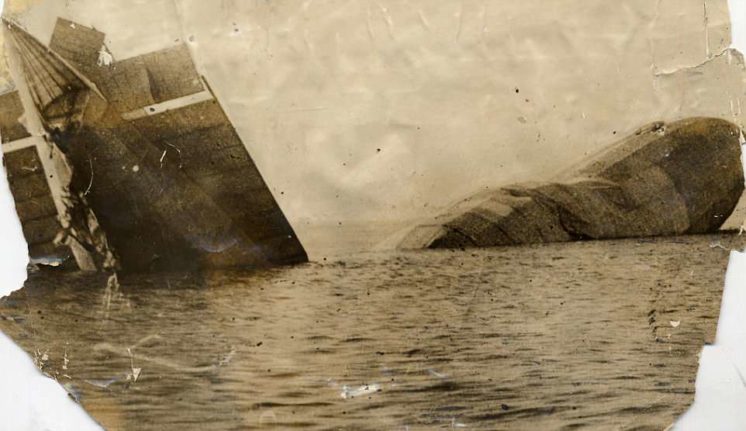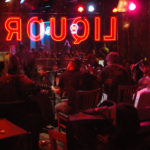Zeppelins Over Duluth
 From the book The First Time Germany Invaded Duluth, Minnesota by Peter S. Svenson:
From the book The First Time Germany Invaded Duluth, Minnesota by Peter S. Svenson:
“July 1, 1917: The Weltanshauung, a German hydrogen war-zeppelin, lost power over Bavaria. Captured by the wind, for the next two weeks it blew north across Europe and then the Arctic Circle. The furious crew tried fixing the engines but never succeeded. Technically, they set the World Record for the first arctic crossing by air, a feat later repeated by Shackleton.”
From “Zeppelins Over Duluth!” Duluth Herald, July 16, 1917:
“The Weltanshauung contained an internal airplane hangar with six black tri-planes that emerged from the nose of the craft like hornets. A Canadian fighter squadron looked for the zeppelin over Lake Erie and almost collided with it in the dark. It was a cliff face hanging in the sky, dwarfing them with the black-cross-on-white symbol of the German Air Force. But the Canadians lost it in confusion and fear. Soon a lake steamer spotted it drifting within sight of the North Shore of Lake Superior, toward Duluth. The authorities mobilized the American helium zeppelin, the Federalist, from its floating hangar in the Duluth harbor.
“But tragedy struck at launch. In the hurried operation, five members of the mooring crew failed to let go of the mooring lines as a gust rose the Federalist unexpectedly. They were yanked well into the air. Their instincts told them to hang on, but that was a fatal misstep. Soon they were hundreds of feet up while crossing over Park Point, and their grips failed one by one. They fell to their deaths, witnessed by a city already in terror of the vast German airship emblazoned with its iron cross looming, coming into full view as it drifted toward downtown.
“Duluth faced its first air raid – let it be the last. It was unthinkable that the enemy had penetrated to the middle of North America. And now, trying to bring her guns to our defense, the Federalist had botched its take-off, dropping screaming men through the sky. The city gasped as one, crying out as the men smacked sickeningly into Lake Superior like ragdolls.
“The last man to fall from the dangling mooring lines was Jean-Michel Cloquet, a local volunteer. Doing his duty for his country, all he’d hoped to gain was, at most, a sandwich. Instead, his payment is a place in the history books, because he was rescued in mid-air by a daredevil Curtiss JN-4 Jenny bi-plane pilot before the eyes of the city. Duluth’s hopes began to lighten at that moment.”

“The authorities mobilized the American helium zeppelin, the Federalist, from its floating hangar in the Duluth harbor”
From the transcript of an audiotaped 1995 interview by Peter S. Svenson, Deathbed Interview with pilot George Enger III, Duluth’s WWI Fighting Ace:
[Scratchy, hissy tape noises. The centenarian’s voice starts hardly above a whisper, but grows in force.] “Back then the Duluth Airport was a dirt runway and a shack. There was no United States Air Force. The nation’s few zeppelins were under control of the Army. Or was it the Navy? What we did have in terms of airplanes were these four Jennies on loan from Canada for training purposes. The air wars of the future weren’t going to wait around for American pilots to learn to fly. My squad of four backwoods boys had never seen combat. And the trainer planes were beat to hell. They didn’t even have guns! But we had to do something. When we got the call, we suited up, grabbed our pistols, and took off.
“Speeding over the hill toward the scene above the lake, the zeppelins came into view. Like everyone, we saw those poor men falling from the Federalist as it climbed. One after another, they seemed to keep falling and they are still falling.
“The last sliver of sun slipped under the horizon behind us. It was the magic hour. The air turned cream. The clouds and the lake glowed with pastel pinks and purples like a Maxfield Parrish print. I met Parrish once — long story. The falling men were silhouetted against a stack of cumulo-nimbus and its reflection on the sea. As we approached the zeppelins, there was one last man whose grip failed. I broke formation and dove after him.
“I matched his terminal velocity as the unforgiving water drew up. The distances closed. He saw me and tried swimming through the air to the plane. Finally the edge of my wings reached his hands. He hoisted himself between the bracing wires and held on as I pulled out of the dive. And he was shouting over the wind, praising the Lord and so on. Boy he could not believe his luck. The wheels kissed the water and we began climbing.
“I shouted to him: ‘I’d let you off pal but we gotta kill these guys first! You might want to get in the back seat there!’ So he climbs in and he’s yelling, ‘Let’s get ‘em! Wait, what’s that sound?’ We realized the whole city saw me pluck him from the air, and that sound was people cheering from the hillside and the trainyard and the downtown and the beaches. The wind and engine noise had nothing on those cheers. When I rejoined my formation, the town just about lost their minds.
“The Weltanshauung dropped water ballast in a great spray like it was voiding a bladder in fear, and tried to climb out of our range. The Federalist would have to handle it. Really there was nothing my squad could do against a zeppelin. Without incendiary rounds our pistols were toys. At best we might cause a slow leak, but only if we hit it from above. Bullet holes in the underside do no good, the buoyant gas won’t flow down and out.
“So we were limited. But I’d made a name for myself with my unorthodox tactic of trailing a grappling hook and line behind my plane to rip apart enemy wings. I proved it was plausible in training anyway — airplane wings were just wood and fabric — and now I was eager to use it in combat. Our job was not to bring down the zeppelin. It was to harass its fully-armed, high-performance fighter planes.
“The six black tri-planes swarmed from the nose of the enemy vessel. I would normally lead my squad’s formation but I lost time saving Cloquet, so I was in back. Regardless, as one we pulled our latches, releasing a rope and grapnel from each fuselage. We were fishers of men. Their fighters buzzed us in a first pass, scoring no direct hits, but our grapnels raked through the wings of three triplanes. They tumbled down impacting the water: boom, boom, boom. More cheering. The German planes were now outnumbered.”
From Jean-Michel Cloquet’s memoir, Scions of Cloquet (1946, out of print):
“I was freezing. Even though it was the middle of summer, I wasn’t dressed for an open-cockpit plane duel thousands of feet above Lake Superior. But the dogfight was heating up. A German fighter strafed the Federalist from above, blunting its ascent and halting the majestic but doomed airship’s pursuit of the Weltanshauung.
“Even with the enemy’s stricken engines, the wind alone was going to take the craft over the helpless city. Indiscriminate bombing was a certainty if the zeppelin climbed out of our reach. God forbid they hurt the war effort if they mangle train tracks or blow up U.S. Steel.
“We tore two more German fighters from the air. It was too late to save the limp Federalist, but maybe we could still save America.
“Leaving the last tri-plane to his fellows, George pointed our plane at the sky. We climbed toward the clouds and the engine protested thinning air. At last he got above the Weltanshauung, landing on its back like an aircraft carrier. We rolled to a stop at the rear with a view of its vertical stabilizer, the tail fin of a Leviathan.
“I took his pistol and a signal flare and sprang from the cockpit. Aiming between my feet, I holed the zeppelin several times. George shouted, ‘Here they come!’ German airmen emerged from a distant hatch like angry ants yelling and shooting. I ignited the flare. Tossing it at the bullet holes, I grabbed the side of the plane with my other arm and shouted, “Go!” He was already going. I clawed into my seat as we rolled off the back, in between the mammoth vertical and horizontal stabilizers into open space, my stomach rising into my throat.
“The gas bags ignited. The burning zeppelin lit the pastel dusk with the oversaturated orange of crepuscular flames. Seething glows crawled the soft cloudbanks as black smoke scarred the sky.
“The last German plane zigged when he should have zagged: panicking and wounded by a pistol shot, the pilot darted beneath the lurching hulk. He was downed by gobs of molten aluminum raining among flaming men, dropping from the clouds into the sea.”
From the book The First Time Germany Invaded Duluth, Minnesota by Peter S. Svenson:
“As the Federalist sagged, a bracing wire inside it snapped and lashed through the gas bags. The craft broke in two spilling crew from its interior walkways. The fore section landed in the hundred-foot-deep water off Leif Erikson Park. The multi-ton superstructure collapsed over the control gondola, drowning those inside as it sank.
“Nearby, the aft section had slower gas leaks and stayed afloat for several hours. Some trapped crewmen drowned in its submerged corridors, but many survivors managed to scramble atop the wreck to await rescue. Their voices sounded tiny and high-pitched in the helium-dense atmosphere, and they could not help but laugh about it. They grew lightheaded as the helium displaced oxygen. Punctured bags sounded flatulent as they discharged gas in the waterlogged fabric draping aluminum bones. Even though crew were drowning beneath them, the survivors rolled around laughing on the wreck, helpless at the sound of their own laughter. The voices of the drowning — wails and moans of despair, choking and gurgling — also sounded silly and hilarious. It couldn’t be helped. Even the drowning men laughed at their own cartoon-mice death-cries as they slipped into the deep: ‘My family — HAHAHA — tell my wife I love her — HAHAHA — glub glub glub — HAHAHA.’”
An index of Jim Richardson’s essays may be found here.
Recommended Links:
Leave a Comment
Only registered members can post a comment , Login / Register Here














4 Comments
ChefmnPatg
about 2 years agoChefmnPatg
about 2 years agoJim Richardson (aka Lake Superior Aquaman)
about 2 years agoRobert Lillegard
about 2 years ago